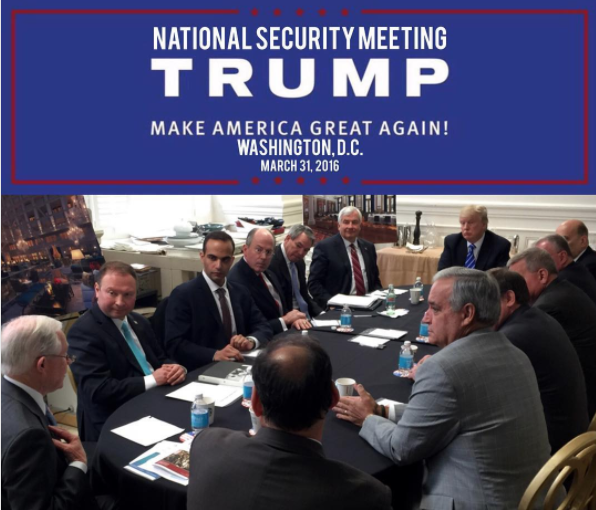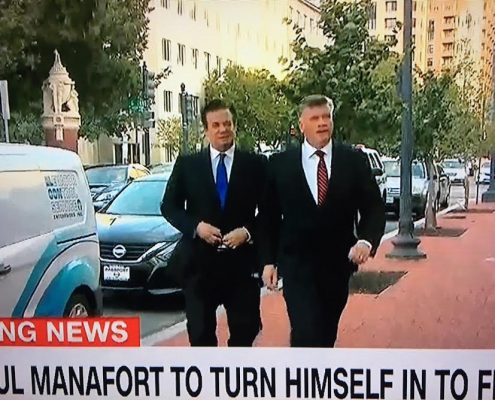Three weeks after their indictment, Paul Manafort and Rick Gates are still fighting over their bail conditions.
That was most recently demonstrated by the government’s response to Gates’ request for permission to (basically) serve as house husband, with leave to spend over two hours every day to ferrying his kids to school while purportedly under house arrest, a motion the court denied. The government objected to the request because “To date, only the defendant’s signature secures his bond (together with his house arrest),” though the problem might be more accurately described as Gates fucking around with bail negotiations, probably because he can’t substantiate his assets in such a way that they can be posted for bail.
In a telephone call late on the afternoon of November 15, 2017, defense counsel informed the government that they intended to make a bail modification motion and sought the government’s position. The government responded that it was not able to take a position until it had the opportunity to review the defendant’s motion.
[snip]
Although more than two weeks have passed since the defendant’s arrest, he has not completed any paperwork to post his house, or any other property, and has failed to answer a series of questions about his assets.
[snip]
Only yesterday did the defendant offer to arrange interviews of his two proposed non-family-member sureties, both of whom apparently live outside the Washington, D.C. area.3 Finally, the government continues to have concerns about the accuracy of the defendant’s account of his net assets, which has evolved from the representation that he had “limited assets that include only a single home,” ECF#21 at 5; to his most recent Personal Financial Statement, which included a securities/brokerage account valued at more than $1.3 million and a total net worth of more than $3.4 million.
3 Those interviews are now scheduled for Thursday, November 16, 2017. Counsel has noted that one proposed surety already serves as a surety for a relative who is currently charged in the United States District Court for the Southern District of New York, a circumstance that, at least at first blush, raises certain concerns.
Though it was even more clearly laid out in the government’s November 5 opposition to Manafort’s request to change his bail conditions, in which the government laid out the difficulties of finding $10 million that Manafort can post for bail. In that they laid out three different line items in Manafort’s assets, two of which he wants to post for bail, that the government believes are inflated.
A. 5th Avenue, New York, NY (claimed net asset value $3 million):
The government does not presently have sufficient information to assess the claimed net asset value of this property, or even to be confident that the property has equity in it at all. Based on communications with Manafort’s counsel, the government understands that the $3 million net asset value is based on a fair market value of $6 million, reduced by a $3 million mortgage on the property obtained from UBS. This fair market value is not, however, backed by an appraisal or even any open source estimates (which in many cases may not be particularly accurate). Rather, Manafort provided the government with an open source estimate for a different unit in the building, listed as approximately $4.5 million, which Manafort believes is below the fair market value of his own unit, which is on a higher floor. Meanwhile, the government has searched open source real estate value estimators and found one that lists the value of Manafort’s own unit as $2.5 million, and another that lists the value as $2.7 million.
Until an independent appraisal of the property is obtained, the government cannot agree that this property is appropriate as a security.
[snip]
C. St. James Drive, Palm Beach Gardens, FL (claimed net asset value $1.5 million):
Based on the information available to the government, we are comfortable with the use of this property as security, although the open source estimate provided to the government by Manafort shows a fair market value of $1.25 million rather than $1.5 million. As a condition of using this property as security, Manafort and his wife should be required to waive any homestead exemption that may be available under Florida law and to agree not to encumber the property in any way.
[snip]
Although Manafort has provided the government with a spreadsheet listing his total assets at approximately $28 million, the government has yet to substantiate Manafort’s net worth. Indeed, we continue to have questions about that sum. For example, with respect to a property held by Manafort in Brooklyn, he asserted the value at $9 million, when a recent appraisal comes in at substantially lower (in the $5 to $6 million range). The spreadsheet provided by Manafort also lists values of other assets, such as securities, that do not match information available to the government or that cannot be substantiated at this time. Additionally, in prior years, through at least 2014, Manafort reported a $6 million asset in Ukraine on his tax returns; Manafort has claimed that it lost all value. In short, the government seeks to further understand the full extent of Manafort’s wealth.
They’re doing this while appearing quite reasonable (for example, letting Manafort’s wife and daughter serve as sureties, not to mention letting them stay out of jail altogether). It seems increasingly clear why: because the very process of trying to negotiate bail, for both men, is involving a whole lot of disclosure — which presumably replicates documentation the government has collected on its own — of further money laundering. In just those three paragraphs, for example, the government has laid out almost $10 million in money that Manafort has either vanished or lost as his money laundering vehicles lose value.
Meanwhile Bloomberg has a piece — the long overdue counterpart to my (still) favorite piece of Manafort journalism, the Weekly Standard piece showing it is impossible to spend $1 million on antique rugs in Alexandria — that lays out the discrepancies between the amounts the indictment say Manafort spent on his homes in the Hamptons and Florida and what his contractors reported would be spent.
Special Counsel Robert Mueller, in his indictment, says that a Hamptons firm got $5.4 million in wire transfers from Cyprus over 71 payments. But building permits over the same period examined by Bloomberg show that renovations by Manafort’s Hamptons’ contractor were estimated to cost $1.2 million. That’s less than a quarter of what was ultimately sent—an apparent discrepancy that could draw scrutiny from investigators.
[snip]
Building permits in Southampton estimate that the cost of SP & C’s renovations would come to $687,000. In Brooklyn, the work is estimated to cost $527,900 though it isn’t clear whether SP & C or another contractor completed the project. Either way, the estimates fall more than $4 million short of the amount “Vendor A” was paid.
[snip]
During an inspection in April 2013, the Southampton assessor determined that the replacement cost of the pool house was $132,172, a less than a third of the quoted price. A pergola, estimated to cost $35,000, would cost $16,550 to replace by the assessor.
Lisa Goree, Southampton’s sole assessor, said renovation costs aren’t necessarily reflected in a home’s assessed value. “He could spend $1 million on a statue in front of the house,” she said. “It doesn’t mean we’re going to increase the assessment by a million dollars.”
There is also a gap between renovation estimates on Manafort’s Florida 3,300-square-foot house—located in a gated community overlooking a golf course and palm-lined canal—and the amount paid to a “Vendor J, a contractor in Florida,” according to the indictment. He wired $432,487 to the Florida contractor; building permits estimate that renovations on his Palm Beach Gardens house would cost about $140,000.
Incidentally, a friend told me one of her friends has been at the Hamptons property, and was led to believe it was actually owned by Manafort’s nephew.
I feel like Mueller’s prosecutors are playing with these two men as cats play with balls, just patiently batting them around, waiting for the inevitable admission that they can’t make bail because they don’t have assets they can put up because everything they own has been laundered. At which point, after getting the judge rule over and over that they’re flight risks, I suppose the government will move to throw them in the pokey, which will finally get them to consider flipping.
Update: Totally unrelated, but totally related, Global Witness has an investigation of how Trump has partnered with a whole lot of mobsters who use his Panama property as a laundering vehicle.
Update: Here we are Monday and Gates and Manafort still haven’t found anything liquid to put up as bail. Not only that, but in a filing raising a potential conflict with one of Gates’ money laundering expert lawyers, prosecutors reveal Gates is trying to have his partner from a movie-related firm’s brother serve as surety while also doing so for the partner.
Marc Brown, the brother of defendant Steven Brown, was proposed by Gates as a potential surety despite the facts that they seemingly do not have a significant relationship, they have not had regular contact over the past ten years, and Marc Brown currently serves as a surety for his brother Steven in his ongoing criminal prosecution in New York. In an interview with the Special Counsel’s Office on November 16, Marc Brown listed as a reason for seeking to support Gates that they belonged to the same fraternity (although they did not attend the same college) and that, as such, he felt duty bound to help Gates. Of note, Marc Brown’s financial assets were significantly lower, almost by half, than previously represented by Gates.




